Wrapping Up
Notice: The cowboy is alive and well. Don't be fooled by the big belt-buckle wearing, giant pick-up truck driving posers with the "Save the Cowboy" bumper-stickers.
 Though cowboy-don may be little more than the saddest of cliches in the US, rest assured that cowboys do in fact live on. He's just relocated, to a place that offers the one thing necessary for real cowboys: Tibet, and it's vast open spaces (the one thing).
Though cowboy-don may be little more than the saddest of cliches in the US, rest assured that cowboys do in fact live on. He's just relocated, to a place that offers the one thing necessary for real cowboys: Tibet, and it's vast open spaces (the one thing).Now, technically he should be called a "yakboy," since it's yaks he herds from his steed, but I won't split hairs. And those steeds tend to be small; they tend to look more like ponies than horses. But that isn't the point. And, actually, I think oftentimes the herding is done without those horses at all-- but that's inconsequential as well. Oh, and I've never been to Tibet. But I know what I'm talking about.
The morning after I wrote the last entry I traveled further west in the province of Sichuan
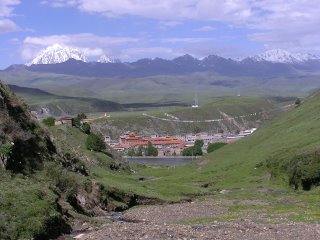 to Tagong, the first truly Tibetan town I visited in China. At an altitude of 3800m, the people who lived there are ethnic Tibetans, and as such they speak the Tibetan language (and not necessarily much Chinese), eat Tibetan food, wear Tibetan clothes, live in Tibetan houses (or tents), etc. They practice sky burials instead of burying their dead underground (more later). They are Tibetans, and my point is simply that Tibetans are distinct from the Chinese (or Han Chinese, if you like). But Tagong is not merely Tibetan-- it's the Wild East, living on years and years after the Wild West was fenced-in, tamed and covered in tract-housing. And the Tibetans of this region are not just anyone-- they are cowboys.
to Tagong, the first truly Tibetan town I visited in China. At an altitude of 3800m, the people who lived there are ethnic Tibetans, and as such they speak the Tibetan language (and not necessarily much Chinese), eat Tibetan food, wear Tibetan clothes, live in Tibetan houses (or tents), etc. They practice sky burials instead of burying their dead underground (more later). They are Tibetans, and my point is simply that Tibetans are distinct from the Chinese (or Han Chinese, if you like). But Tagong is not merely Tibetan-- it's the Wild East, living on years and years after the Wild West was fenced-in, tamed and covered in tract-housing. And the Tibetans of this region are not just anyone-- they are cowboys.Some are nomads, who live in these awesome big, black tents. Others live in stone houses reminiscent of medieval European castles, if on a very small scale . . . but enough about Tibetan cowboys. I don't suppose it would be worth the time to describe further, especially since I'm not entirely sure I can back up all I've said above . . . I only brought it up in the first place because I was trying to avoid another "Since I last wrote . . . " beginning.
Anyhow, Tagong was really great. A small town with a lot of character set amidst huge and beautiful grassy, rolling hills.
Backdoor Man
From Tagong I continued westward to a much larger, Chinese-ified (consistently agreed to be a bad thing amongst all the Westerners I know of, though if you're into the total absence of
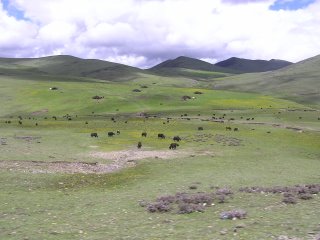 character and charm you might be the exception) town called Litang, elevation 4100 m. From there I intended to move further west to the town at the border with the Tibetan Autonomous Region-- that is, the area the Chinese government has labeled "Tibet," though the Dalai Lama (amongst others) feels that the designated Tibet ought to include all Tibetan areas, such as western Sichuan (I have the feeling all this isn't very clear but I'm going to keep writing-- my apologies . . .). Due to some particular (though mundane) circumstances I won't bother describing and a perhaps questionable decision, I headed south instead of west (still trying to get to Tibet), thus beginning a couple weeks worth of "backdoor" action that I wasn't entirely sure I wanted in the first place.
character and charm you might be the exception) town called Litang, elevation 4100 m. From there I intended to move further west to the town at the border with the Tibetan Autonomous Region-- that is, the area the Chinese government has labeled "Tibet," though the Dalai Lama (amongst others) feels that the designated Tibet ought to include all Tibetan areas, such as western Sichuan (I have the feeling all this isn't very clear but I'm going to keep writing-- my apologies . . .). Due to some particular (though mundane) circumstances I won't bother describing and a perhaps questionable decision, I headed south instead of west (still trying to get to Tibet), thus beginning a couple weeks worth of "backdoor" action that I wasn't entirely sure I wanted in the first place.The Lonely Planet likes the term "backdoor." By deciding to go southward, I began what the Lonely Planet calls the "backdoor" route between the Tibetan areas of Sichuan and Yunnan provinces, at the end of which I would immediately begin to try to sneak into Tibet via yet another "backdoor." Had I made it to Lhasa I might possibly even have traveled the "backdoor" from Qinghai province to northern Sichuan, at which point (if I'd had lots more time) I could have headed back up north via the "backdoor" route to Gansu. So, in truth I'm not half the "backdoor" man (boy? guy? doesn't have the ring, but how awkward is it for me to refer to myself as "man"?!?) I might have been. Which is okay.
The Sichuan-Yunnan backdoor involved two long days in buses on dirt roads. The night in the middle was spent at a town called Xiangcheng that has also fallen prey to Chinese-ification.
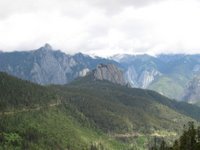 It did, however, have a beautiful Lamasery (Tibetan Buddhist Monastery, since their monks are Lamas). Next to the existing temple they were in the process of building a second one-- almost entirely by hand alone! The only machine I saw on premises was a single chainsaw. Otherwise it was all hands; while I was there they (the construction crew) were lifting beams (teams of 30 men pulling on ropes) to the third story and slotting them into their places. A little ways off from the construction site proper I spent a while sitting with the men carving other beams. Tibetan temples are characterized by lots and lots of color as well as intricate carvings on columns and beams, so it was really cool to see this being done. They taught me some Tibetan while they worked (which I failed to retain).
It did, however, have a beautiful Lamasery (Tibetan Buddhist Monastery, since their monks are Lamas). Next to the existing temple they were in the process of building a second one-- almost entirely by hand alone! The only machine I saw on premises was a single chainsaw. Otherwise it was all hands; while I was there they (the construction crew) were lifting beams (teams of 30 men pulling on ropes) to the third story and slotting them into their places. A little ways off from the construction site proper I spent a while sitting with the men carving other beams. Tibetan temples are characterized by lots and lots of color as well as intricate carvings on columns and beams, so it was really cool to see this being done. They taught me some Tibetan while they worked (which I failed to retain).Xiangcheng and the immediately surrounding region is also home to a distinct form of Tibetan architecture, with moderately trapezoidal houses (narrowing towards the top). And while the town has by and large been swallowed by Chinese Characteristics, on the outskirts the houses are all still in the regional style. One of them has been converted to a guesthouse, and this was where I stayed, which was neat. Not only was the house cool but the people were really nice and he dorm I slept in there, painted in the typical Tibetan fashion, was hands down the most colorful room in which I have ever spent a night.
After a cloudy but still sometimes spectacular journey I arrived the next night in a much larger town called Zhongdian, in Yunnan province. Despite the vast majority of it also being a nondescript, disheartening gray and white tiled Chinese city, they have attempted to rename it Shang-ri-la (officially--meaning they spell it this way when using their Roman script system and this isn't me being clever-- pronounced in Chinese something like "Shang-a-li-la"). It's no Shang-ri-la, though it is home to an "old town" that hasn't yet been entirely commercialized (a different process than being Chinese-ified, but nevermind this). Still, no snow covered peaks around or anything that seemed to me to merit the new name.
I spent a somewhat unfortunate full day in Zhongdian to visit the huge lamasery nearby, said to be the third most important in Tibetan Buddhism (though I wonder if it might not be the third
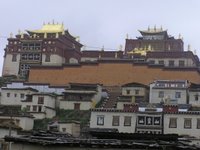 most important of a particular sect of the extremely complicated and surprisingly fractious religion). I didn't enjoy my visit as much as I had in Xiangcheng, though it was interesting to see so many young monks at once. What was interesting about it is that they didn't behave much differently than you would expect any group of teenage boys to act: punching each other, grabbing at each other's robes, wrestling, spraying fire extinguishers at one another (I actually saw this), and making fun of the foreigners, myself included. As for some of their slightly older counterparts, well, I was told that it's something of a "thing" for certain female backpackers to try to sleep with monks. Most the monks seem to have cell phones, and it's not uncommon to see a monk smoking. That said, I should also mention I encountered a few older monks who seemed to be genuinely gentle souls, including one who invited me to sit down next to him while he was chanting inside one of the many temples. I accepted his offer, and the half hour or maybe more I spent sitting there was definitely the highlight of my visit to this particular lamasery, though I did upon leaving feel that it was expected that I make a contribution to the pile of loose bills on the small table in front of him.
most important of a particular sect of the extremely complicated and surprisingly fractious religion). I didn't enjoy my visit as much as I had in Xiangcheng, though it was interesting to see so many young monks at once. What was interesting about it is that they didn't behave much differently than you would expect any group of teenage boys to act: punching each other, grabbing at each other's robes, wrestling, spraying fire extinguishers at one another (I actually saw this), and making fun of the foreigners, myself included. As for some of their slightly older counterparts, well, I was told that it's something of a "thing" for certain female backpackers to try to sleep with monks. Most the monks seem to have cell phones, and it's not uncommon to see a monk smoking. That said, I should also mention I encountered a few older monks who seemed to be genuinely gentle souls, including one who invited me to sit down next to him while he was chanting inside one of the many temples. I accepted his offer, and the half hour or maybe more I spent sitting there was definitely the highlight of my visit to this particular lamasery, though I did upon leaving feel that it was expected that I make a contribution to the pile of loose bills on the small table in front of him.All this seems a bit askew from the rather idealized notions that seems to pervade the Western image of Tibetan Buddhism. I'm guessing this idealization stems largely from the charisma of the Dalai Lama combined with the martyrdom of the Tibetan people at the hands of the Chinese, but no matter where it comes from. The funny thing about Tibetan Buddhism in light of this perception in the West is that, to the (pretentious) casual observer (me), it seems to be especially divergent from what I'll call the Western secular understanding of "pure" Buddhism (since we in the secular West seem to presume to understand the true message of all religions . . . or is it just me?). Meaning there's loads worship of god-like figures and various other aspects seemingly unhelpful towards the end of "extinguishing" the ego, so to speak. I tried to restrain myself from jumping to conclusions-- as it's not as though I've heard someone explain it or gave it much of a chance-- but my constant compulsion to judge everything instantly mostly got the best of me.
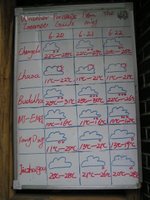 By this time I was beginning to grasp that June was not the best time to be in the mountains (part of the greater Himalaya) of southwestern China, as the rainy season was setting in. I knew this beforehand, but didn't worry about it because in the tropics "rainy season" oftentimes means an hour or two of torrential rain each day and otherwise decent weather. Well, not so where I was-- I didn't see any sun during the whole of my backdoor escapades. Everyday overcast, with the gaps between occasional heavy showers filled by on and off drizzling. It was icky.
By this time I was beginning to grasp that June was not the best time to be in the mountains (part of the greater Himalaya) of southwestern China, as the rainy season was setting in. I knew this beforehand, but didn't worry about it because in the tropics "rainy season" oftentimes means an hour or two of torrential rain each day and otherwise decent weather. Well, not so where I was-- I didn't see any sun during the whole of my backdoor escapades. Everyday overcast, with the gaps between occasional heavy showers filled by on and off drizzling. It was icky.Plans and Landslides
From Zhongdian I headed out on the Yunnan-Tibet backdoor, which took me to Deqin, the last major (that is, Chinese-ified) town in Yunnan before Tibet. The area is supposedly beautiful but I cannot confirm or deny thanks to the ubiquitous cloud cover. I spent a full day trying to get out of there and into Tibet-- which was a complicated (within in the spectrum of my life lately, anyhow) thing to try to do. You see, Tibet is officially closed to foreigners without a permit. The funny thing about permits to Tibet is that they are expensive, but don't actually exist. Meaning, you pay a whole bunch extra for your "permit" when you (as a foreigner) buy a plane ticket to Lhasa, but you never actually receive anything at all.
[Most of you will probably want to skip or skim the next four paragraphs.]
I didn't like the officially sanctioned ways to get to Tibet for three main reasons: First, it required flying to Lhasa (actually there is one overland route approved for foreigners who pay for their "permit", but I knew I didn't have time for it besides not liking the permit business), which means missing everything in between. Well, it just so happened that everything in between interested me more than pretty much everywhere else in Tibet, as thanks to the above mentioned restrictions relatively few Westerners have been there (which totally changes how the people of a place interact with those Westerners who do visit). And it's supposed to be just stunning landscape, etc. In my original planning (or should I say dreaming?) Lhasa itself seemed to me a good end-point, but despite various sights I wasn't overly interested in it itself, as by all accounts it has been the victim of a rather concerted, merciless (yep, you guessed it!) Chinese-ification. So yeah, I wanted to go overland for its own sake.
Second, I didn't want to pay for it. Not only did I not want to spend the money for not-spending-money's sake (at the ATM yesterday I finally overdrew my bank account (by $22), thanks to the purchase of plane tickets a few days ago (parents: not an emergency, I have enough cash to get home)), but also I didn't like the principle. The Chinese charge for entrance to EVERYWHERE. You want to go visit a nice park? 10 Yuan. A pretty lake in the mountains? 60 Yuan. It's extremely irritating, and especially with the natural sites there's never any question whether the money is doing any good. The money that the Chinese put into natural sites is for things like paved paths and handrails (in this way not so different from the US NPS, actually . . . ) as opposed to trash clean-up or restoring damaged areas or something, but anyhow one usually gets the sense the money's just lining the pockets of the local Party member. Regardless, I quite liked the prospect of NOT paying this one fee. (Just to be clear-- about the money thing above, I haven't actually cut it that close-- I have a few hundred dollars of traveler's cheques left over, in addition to spending on some gift type purchases over the last few days.)
Third, I liked the broader principle/romance of it. That is, I liked the principle of not doing it as the Chinese would have me do with regards to entering Tibet since it shouldn't be theirs in the first place. And since they've been real bastards since taking over as well. And I liked the romance of sneaking into Tibet because there's a long romantic history of doing just that (I'm thinking mostly of Heinrich Harrer and Seven Years in Tibet). The second of these was especially alluring to me in that they might do away with restricting foreign travel in Tibet in the near future, meaning it will no longer be possible to sneak into Tibet (nevermind that this undermines my "broader principle" thing described earlier in the paragraph).
The last thing I should mention about these plans of mine-- before undue accusations (or praise) of recklessness come my way-- is that I knew what I was potentially getting myself into. I spent some significant time researching this, and found out from several sources that if caught I was looking at a fine of 200-300 RMB ($25-37.50), which is notably less than the permit (which ranges from 400 to 1600 RMB depending on where you get it), and getting sent back out of Tibet from whichever way I entered. I wouldn't have attempted to get into Tibet this way if I had been facing the prospect of Chinese jail or a heavier fine (nevermind that this undermines my "romance" thing described in the previous paragraph). Oh yeah, and lately the police hadn't been enforcing the permits on my intended route, so my chances of being fined and turned around were actually quite low. (More undermining . . . )
Anyhow, as it turned out I never got the chance to try. The road between Deqin and Tibet was closed due to a landslide, courtesy of rainy season and a recent heavy storm. There were neither bus nor truck drivers with whom to make an arrangement for my transport. Not that I necessarily would have been able to do so if the roads were open, especially given my lack of Chinese and Tibetan. After a few days of people in town telling me (my communication-with-limited-language skills are reasonably good at this point in time) the pass would open "tomorrow" ("ming tien"), I came to realize that if there was a Chinese (or Tibetan) equivalent to the Arabic "Inshaaalah" (Rich: sp?), I didn't know what it was. (That is, "tomorrow" meant "eventually" as opposed to the following day.) It was about this time that I actually sat down and realized that if I was going to make it back to the States in June that I was out of time for Tibet. To stay into July would have required a visa extension (which I probably would have had to backtrack to get), borrowing money from my parents, and missing out on what should be an amazing river trip on the Middle Fork of the Salmon that my friend Erick has invited me on. I didn't want to do any of those things, and the truth is that, well, I didn't want to stay in Asia any longer. I feel . . . satiated. I'm ready to done being a foreigner; a "farang" (Thai)/ "falang"(Lao)/ "barang" (Khmer)/ "waigouren"/ "laowai"(both Chinese). It's interesting to me, and perhaps telling of a different mindset in Indians from East Asians, that I never became aware of the word for foreigner in Hindi, though perhaps it's telling mostly of my relative naivete earlier in my trip, or maybe just India's linguistic diversity, or both. The bottom line is that I didn't have the desire to extend my travels, even if that would have allowed me to travel to the one true Shang-ri-la itself (whatever that might be).
In the last entry I included a quote at the beginning, from an entry I started to write before I had discovered that my anemia was gone. In it I said that I probably didn't have enough time to do it right anyways. Well, I may have been saying this to make myself feel better at the time, but that doesn't mean it wasn't true. In fact I basically didn't have enough time. If things had gone a little closer to perfectly, and I hadn't made that one rushed decision to do the whole backdoor thing (back in Litang) it might have been possible to get to Lhasa and back overland-- though even then it would have been unfortunately rushed. In truth I was still trying to do what I had originally given myself two months to do, prior to getting malaria and anemia and, well, you know the story. Things would have gone more smoothly (and been less dismally gray) in pre-rainy season early May as well. For the record, however, I'm not sorry about how my time was spent on account of my malaria. Visiting Cambodia was really nice and spending a week in hospitals, while not always fun (it did have its enjoyable moments), was an experience for which I am grateful, given that everything turned out well. It was a week entirely unlike others I have known . . .
Out Throught the In Door
So I turned around . . . with the road to Tibet closed and a lack of willingness to wait there was nothing else I could do. And so, in a sense, I began my trip back home, first stop Zhongdian. From there I decided that, though the prospect didn't entirely thrill me, my best option was to go back out through that old
 "backdoor" route to Sichuan, just as I had come. All in all it turned out well-- the weather was better and so I saw a lot of things that had been obscured the first time through; I ended up spending the better part of it traveling with some friendly Australians, which was nice; I stayed in one new town along the way, and also discovered that most of Litang was thoroughly Tibetan and beautiful and I'd just missed it in my haste and quick-judgment going the other direction. I noticed elevation signs at passes and so learned
"backdoor" route to Sichuan, just as I had come. All in all it turned out well-- the weather was better and so I saw a lot of things that had been obscured the first time through; I ended up spending the better part of it traveling with some friendly Australians, which was nice; I stayed in one new town along the way, and also discovered that most of Litang was thoroughly Tibetan and beautiful and I'd just missed it in my haste and quick-judgment going the other direction. I noticed elevation signs at passes and so learned 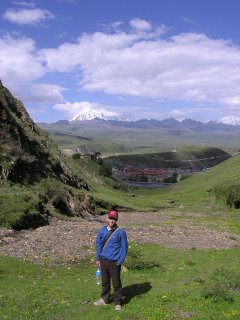 that I'd already been as high as 4716 meters (over 15000 ft.) high going the other direction-- easily the highest I've ever been-- and just a little lower at a handful of other passes. Tibet (in the Dalai Lama sense of the label) is a very high place. Oh yeah, and I got to go back to Tagong, which by this time I had realized was probably my favorite place I had visited in China (if in part because it's so thoroughly not Chinese), and somewhere deserving of at least a little more time. I knew it was amazing when passing the other direction, but since it was my first stop in a Tibetan area my feeling was something like, "wow, just think how everything else is going to be . . . "
that I'd already been as high as 4716 meters (over 15000 ft.) high going the other direction-- easily the highest I've ever been-- and just a little lower at a handful of other passes. Tibet (in the Dalai Lama sense of the label) is a very high place. Oh yeah, and I got to go back to Tagong, which by this time I had realized was probably my favorite place I had visited in China (if in part because it's so thoroughly not Chinese), and somewhere deserving of at least a little more time. I knew it was amazing when passing the other direction, but since it was my first stop in a Tibetan area my feeling was something like, "wow, just think how everything else is going to be . . . "Above written 6/26; below continuing 6/27.
I had a very nice stay there. A highlight of my visit was spending a night in a monk's house.
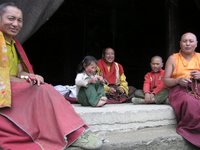 Having wandered into the hills during the day I found myself at a small monastery where a group of monks and laymen and a few children were sitting out in front. A small boy showed me about the monastery; the men were attending to some kind of business, which turned out to be counting prints of Tibetan Buddhist images that the monastery sells to raise funds. After they finished, the monk who appeared to be running things invited me to eat with him. I ended up spending the afternoon, which was spent mostly sitting about his house, communicating what we could. We did, however, spend some time with his elderly mother, which was really interesting. The older Tibetans have the most amazing, weather-worn faces. In the end, my friendly monk host invited me to sleep at his house, in one of the beds he keeps for visiting monks. I initially
Having wandered into the hills during the day I found myself at a small monastery where a group of monks and laymen and a few children were sitting out in front. A small boy showed me about the monastery; the men were attending to some kind of business, which turned out to be counting prints of Tibetan Buddhist images that the monastery sells to raise funds. After they finished, the monk who appeared to be running things invited me to eat with him. I ended up spending the afternoon, which was spent mostly sitting about his house, communicating what we could. We did, however, spend some time with his elderly mother, which was really interesting. The older Tibetans have the most amazing, weather-worn faces. In the end, my friendly monk host invited me to sleep at his house, in one of the beds he keeps for visiting monks. I initially 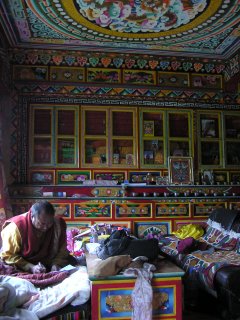 declined, but he insisted, and frankly I didn't really want to turn him down. It was a pleasant stay, to be sure, and I appreciated the chance to get a better sense for how Tibetans live. For instance, I got to witness the use of yak dung as fuel in a fire (there aren't any trees around) and eat real, unfancified Tibetan food. Some of this included yak butter tea (yak butter melted in hot water), sampa (some kind of flour-- maybe barley-- kneaded with yak butter and hot water until it makes a kind of dry dough, which is what you eat), green chilis dipped in salt, and some very dense (and very good) bread. An austere (if fatty!) diet, but hearty too. In any case it seemed to make good sense in that environment-- which includes features such as the ground being frozen over half the year.
declined, but he insisted, and frankly I didn't really want to turn him down. It was a pleasant stay, to be sure, and I appreciated the chance to get a better sense for how Tibetans live. For instance, I got to witness the use of yak dung as fuel in a fire (there aren't any trees around) and eat real, unfancified Tibetan food. Some of this included yak butter tea (yak butter melted in hot water), sampa (some kind of flour-- maybe barley-- kneaded with yak butter and hot water until it makes a kind of dry dough, which is what you eat), green chilis dipped in salt, and some very dense (and very good) bread. An austere (if fatty!) diet, but hearty too. In any case it seemed to make good sense in that environment-- which includes features such as the ground being frozen over half the year.The environment impacts every aspect of the lives of Tibetans-- it has to in such a high, extreme place. It also affects how they go about dealing with their deceased. The Tibetans practice what are called "sky burials," which involves the body being carried to the top of a designated hill or mountain by a priest of sorts (who performs only this one religious function and apparently is somewhat socially stigmatized in life outside his duties), who then cuts the body up into pieces in a particular way such that vultures are more easily able to consume the body. Friends and loved ones gather on site to watch it take place. Though I don't suppose I would have the stomach to witness one myself, I think this rather atypical (to my knowledge, anyhow) "burial" is pretty neat. It's seen as a final act of generosity to the material world within Tibetan Buddhism (giving one's body to the vultures), and addresses the issue of disposing of carcasses in a place where digging big holes isn't really possible so much of the year (since the ground is frozen). Beyond that, I like the fact that the ritual takes place on hilltops. I walked up to several sky burial sites during my stay in Tagong, and all of them were just beautiful spots.
Finishing up on 6/29, from my dad's place . . .
Heading Home
I spent a few days in Tagong then headed back to the humid sub-tropical lowlands and in particular the hazy, polluted metropolis of Chengdu, the site of my Chinese hospital stay. I was there a day or two, bought a plane ticket home, and continued to Beijing. I was unable to buy a plane ticket less than a week in advance, so I ended up with nearly a week there. Though no doubt Beijing has enough to occupy a week's time, I was so thoroughly tired of sight seeing that most of my time there I was just waiting for the days to pass until my flight. I did see the biggest of the sights, namely the Forbidden City and the Great Wall. I found the Forbidden City a little disappointing, but maybe it's just because I didn't know enough about the historical background to make it exciting. It was extremely large . . . I did enjoy seeing Tiananmen Square (also gigantic)-- during my first walk through it I had the last of my "What am I doing here?" moments of the trip. I think this reaction was largely due to the fact that it was the site of the '89 protests and massacre; it's just so hard to imagine anyone protesting in China (for obvious reasons).
Perhaps the highlight of my time in Beijing was my visit to the Great Wall. I was able to go to an unrestored, almost unvisited section of the wall, and it was just really great-- something that turned out as good as or better than imagined. There wasn't anyone there besides the nine of us
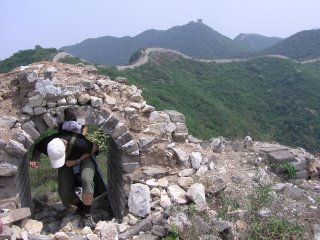 from our hostel and an old fellow who didn't speak any English who led us about (our guide, if you like). And you really could just see the wall stretching on over one mountain/hill (surprisingly steep!) after another. It was impressive, even if the forces behind its creation-- maniacal xenophobia and a whole lot of what I understand to have been slave labor or borderline-slave labor-- were less than entirely noble. I hadn't known previously that the thing didn't really even work all that well: apparently Genghis Khan got himself and his forces past it by bribing the sentries at some spot, supposedly saying, "The strength of a wall depends on the courage of those who defend it." One thing I thought interesting about my visit to the wall was that, with three Israelis and two Americans including myself, over half of our group hailed from places currently somewhere in the process of building our own walls to keep out neighboring foreigners (in all three cases perceived to be racially/ethnically "other", to my understanding).
from our hostel and an old fellow who didn't speak any English who led us about (our guide, if you like). And you really could just see the wall stretching on over one mountain/hill (surprisingly steep!) after another. It was impressive, even if the forces behind its creation-- maniacal xenophobia and a whole lot of what I understand to have been slave labor or borderline-slave labor-- were less than entirely noble. I hadn't known previously that the thing didn't really even work all that well: apparently Genghis Khan got himself and his forces past it by bribing the sentries at some spot, supposedly saying, "The strength of a wall depends on the courage of those who defend it." One thing I thought interesting about my visit to the wall was that, with three Israelis and two Americans including myself, over half of our group hailed from places currently somewhere in the process of building our own walls to keep out neighboring foreigners (in all three cases perceived to be racially/ethnically "other", to my understanding).Other than that I spent a good deal of time reading in parks. That and eating. While Chinese food as a whole still doesn't hold a candle to Indian cuisine in my book, there is some great stuff and I recognized that I would come to miss a lot of it and therefore indulged in frequent meals.
The final sight (of sorts) I visited in Asia proved also to be the strangest: Mao's preserved corpse. Basically, they've (who "they" is I don't know exactly) kept Mao's body in formaldehyde since he died 30 years ago (anniversary coming up in September!), and for a few hours each day he's on display in this large, ugly building in the middle of Tienanmen Square. Visitors wait in line to pass through the building, walking (stopping not allowed) past the body from a few meters' distance. The Chinese come in droves, many leaving bouquets of roses at the entrance. It's perhaps just the most absurd example of the generally absurd Mao idolation that goes in China. How a man who implemented horrific policies such as the "Cultural Revolution" and the "Great Leap Forward" that were responsible for the suffering and deaths of so, so many Chinese managed to make himself into the ultimate national hero is beyond me. Regardless, I didn't find myself thinking somber thoughts inside-- the whole thing seemed like the world's most overdone self-satire.
Anyhow, though it was anything but "before I knew it," eventually the time to fly home came about. The flight went up past Siberia and down the whole of the the west coast of North America, finishing with a run down the length of California. My seat was dead in the middle of the plane, but I was able to spend a lot time staring out the windows by the bathrooms, staring down at the passing ice caps and coastline and, finally, those golden brown hills that represent "home" to me as much as anything.
_____________________________
Afterward: (written 7/12)
Thanks so much for reading this journal of mine these past months-- it means a lot to me. Especially since I've tended to be anything but brief!
I'm in Manhattan Beach now and plan to be mostly around for the next month. I spent last week on a river trip in Idaho, which made for a nice transition back; my gosh LA has been such culture shock. Adjusting slowly, for better or worse . . .
I can't wait to see those of you in the area, and many of the rest of you in the fall!!
Over and out . . .
Josh











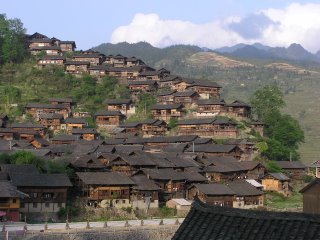

















 a technique to it, and I provided a good bit of amusement when I tried. The young boys especially occupied themselves with this, and it struck me as a great way to occupy the energy of young boys. More productive than Game Boy . . . . And (4) weaving the blanket in the loom. As I said, I didn't get pictures of this fourth step, though I saw several looms-- you can see one in the background of the second picture.
a technique to it, and I provided a good bit of amusement when I tried. The young boys especially occupied themselves with this, and it struck me as a great way to occupy the energy of young boys. More productive than Game Boy . . . . And (4) weaving the blanket in the loom. As I said, I didn't get pictures of this fourth step, though I saw several looms-- you can see one in the background of the second picture.




